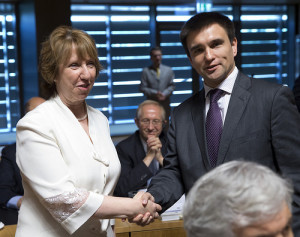The Council adopted the following conclusions in Luxembourg, 23 June 2014:
“1. The European Union welcomes Petro Poroshenko as new President of Ukraine.
It supports the peace plan as a major chance for de-escalation and commends the President’s determined actions towards peace and stability in Ukraine since his inauguration, against the backdrop of increased violent activities by pro-Russia separatists in Eastern Ukraine and the daily loss of lives, in particular the recent downing of a Ukrainian military aircraft killing 49 persons near
Luhansk. This is occurring despite the encouraging talks held with the participation of representatives of the Russian Federation and the OSCE Chairman-in-Office, upon President Poroshenko’s initiative, as well as direct high-level contacts between Ukrainian and Russian authorities. It is now all the more important that they bring rapid and tangible results.
The EU calls on all sides to agree and honour a ceasefire immediately in order to stabilise the security situation, achieve a genuine de-escalation and create the necessary conditions for President Poroshenko’s peace plan to be implemented. In this regard, the EU calls on the Russian Federation to support the peace plan and to adopt effective measures to stop the continued flow of illegal fighters, arms and equipment over the border into Ukraine, to use its influence on the separatists to stop the violence and lay down their arms, to continue withdrawing and refrain from gathering troops again near the Ukrainian border and to cancel the mandate of the Federation Council to use force on Ukrainian soil. The Council also urges the Russian Federation to use its influence to ensure immediate release of the OSCE monitors and other kidnapped persons held hostage by the armed separatists.
2. The Council recalls that the Commission, EEAS and the Member States have been undertaking preparatory work on possible targeted measures, as requested by the European Council in March, so that further steps can be taken should events in Eastern Ukraine so require.
3. The Council recalls its strong condemnation of the illegal annexation of Crimea and Sevastopol and will not recognize it. The Council welcomes the work carried out on the implementation of the legal consequences of the illegal annexation of Crimea. The Council decided to prohibit the import into the European Union of goods originating from Crimea or Sevastopol with the exception of those having been granted a certificate of origin by the Government of Ukraine or to provide, directly or indirectly, financing or financial assistance,
as well as insurance and reinsurance, related to the import of such goods. The Council calls on the EEAS and the Commission to continue to monitor the situation, and to present further measures, as necessary. The Council calls on UN member states to consider similar measures in line with UNGA Resolution 68/262.
4. The European Union is also concerned about the rapidly deteriorating human rights and humanitarian situation in Eastern Ukraine and Crimea, as highlighted by the latest report of the Office of the UN High Commissioner for Human Rights, in particular cases of torture, killings and disappearances of journalists and activists. The European Union commends the Ukrainian authorities for the ongoing inquiries which we expect will shed light on the responsibility for such acts. The Council calls on all sides engaged to do their utmost to protect civilians and, as part of this, to let humanitarian organisations – particularly medical staff – perform their roles, guided by the principles of neutrality, impartiality and nondiscrimination.
5. The EU encourages the Ukrainian authorities to continue their reform efforts, including as regards constitutional and decentralisation reforms, the rights of persons belonging to national minorities, the reform of the judiciary, fight against corruption and improving the business climate. These efforts should be brought forward through an inclusive national dialogue. The Council welcomes the continued strong engagement of the Council of Europe and other international organisations in assisting the Ukrainian authorities to ensure that these reforms are in line with European standards. The EU confirmed its commitment to support the economic stabilisation process in Ukraine through two recent significant Commission disbursements totalling 750 mln EUR in the framework of the State Building Contract and the Macro Financial Assistance in accordance with the conditions set out in the Memorandum of Understanding. In this context, the Council looks forward to the high level donor coordination meeting on Ukraine to be held in Brussels on 8 July.
6. The Council looks forward to the forthcoming signature of the remaining provisions of the Association Agreement, including its Deep and Comprehensive Free Trade Area, later this week. The EU is convinced that the Agreement will give an impetus for political and economic reforms, bringing about modernisation, strengthening of the rule of law and economic growth. The EU confirms its support to Ukraine in proceeding with the provisional application of the Agreement and its effective implementation.
The Council recalls the Commission’s intention to also engage in political level consultations with Ukraine and the Russian Federation on implementation aspects of the agreement, in order to dispel concerns about its possible effects. Russia’s threats of trade measures against countries that sign Association Agreements/DCFTAs are unjustified.
7. The Council agrees to establish a Common Security and Defence Policy mission to assist Ukraine in the field of civilian security sector reform, including police and rule of law. In that regard, the Council approves the Crisis Management Concept, submitted by the HR in response to its conclusions of 12 May. On this basis, operational planning can be pursued with a view to a decision on further steps at its next meeting and an early deployment in the Summer. The Council recalls the importance of coordination and coherence with other EU efforts, with the OSCE, and with other international actors.
8. The EU commends the work already undertaken by the OSCE and its Special Monitoring Mission. The EU will continue to support the Mission and looks forward to its mandate’s extension.
9. Regretting that discussions on the conditions of the gas supply from the Russian Federation to Ukraine within the framework of the trilateral gas talks initiated and facilitated by the European Commission have so far been inconclusive and that gas delivery to Ukraine has been switched to prepayment and then interrupted, the Council urges both sides to reach an agreement as soon as possible and supports the Commission in its efforts to facilitate a compromise solution. An agreement is important for the stabilisation of Ukraine’s economy and for safeguarding the security of supply and transit of natural gas to and through Ukraine
on the basis of a transparent regime. In this context, the Council underlines the importance of continuing energy sector reforms in Ukraine.
10. The Council reiterates the EU’s commitment to enhance people-to-people contacts between the citizens of the European Union and Ukraine, i.a. through the visa liberalisation process in a secure and well managed environment and provided all conditions are met, in line with agreed conditions in the framework of the Visa Liberalisation Action Plan. In this context, it welcomes the Commission’s fourth progress report of 27 May 2014 on the implementation of the action plan on visa liberalisation by Ukraine. The Council shares the analysis that Ukraine has fulfilled all the benchmarks under the first phase of the Visa Liberalisation
Action Plan and decides to launch the assessment of the benchmarks under the second phase.
It stresses the need for full and effective implementation of all benchmarks during the second phase.
The Council looks forward to the Commission’s assessment of the possible migratory and security impact on the European Union of a future visa liberalisation for Ukraine to be presented as soon as possible, and in any event as a matter of priority during the second phase of the VLAP. The Council invites the Commission to continue supporting Ukraine in implementing the Action Plan on Visa Liberalisation, as well as to continue reporting about the implementation thereof, on the possible migratory and security impact and its follow-up, with a view to deciding on the fulfilment of all the benchmarks of the Action Plan on Visa Liberalisation.”
http://video.consilium.europa.eu/?siteLanguage=en
-
In primo piano
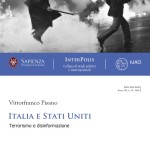 Gli Stati Uniti non sono responsabili del terrorismo...
Gli Stati Uniti non sono responsabili del terrorismo...
7 febbraio, 2017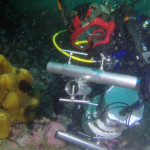 I fondali dell'Antartide sono un mondo che non ti aspetti:...
I fondali dell'Antartide sono un mondo che non ti aspetti:...
29 febbraio, 2016 Discussing Europe with Ms Federica Mogherini
Discussing Europe with Ms Federica Mogherini
17 settembre, 2015
Articoli Recenti
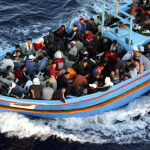 Immigrazione e Nazione
Immigrazione e Nazione
15 novembre, 2024 Filippo Tommaso Marinetti ed il movimento futurista
Filippo Tommaso Marinetti ed il movimento futurista
23 maggio, 2023 Italiani e Francesi “cugini” litigiosi per seri ma anche per futili motivi
Italiani e Francesi “cugini” litigiosi per seri ma anche per futili motivi
6 maggio, 2023 Don Antonino Collurafi da Librizzi, maestro di “broglio” a Venezia
Don Antonino Collurafi da Librizzi, maestro di “broglio” a Venezia
23 aprile, 2023 L'affare Bolo Pascià: un episodio dello spionaggio italiano della Grande guerra
L'affare Bolo Pascià: un episodio dello spionaggio italiano della Grande guerra
19 aprile, 2023
I più letti
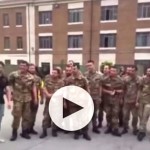 La Folgore intona il canto degli Arditi e la stampa italiana lo etichetta inno fascista – I vertici militari aprono un'inchiesta
La Folgore intona il canto degli Arditi e la stampa italiana lo etichetta inno fascista – I vertici militari aprono un'inchiesta
31 luglio, 2014 Il COCER sui marò: chiediamo di parlare con il Presidente del Consiglio Matteo Renzi
Il COCER sui marò: chiediamo di parlare con il Presidente del Consiglio Matteo Renzi
25 giugno, 2015 Il Ramadan (30 giorni di digiuno, secondo pilastro dell'Islam)
Il Ramadan (30 giorni di digiuno, secondo pilastro dell'Islam)
12 agosto, 2013 Vasco Rossi con il tour “Live Kom '014” a Roma e Milano
Vasco Rossi con il tour “Live Kom '014” a Roma e Milano
29 ottobre, 2013 Il segreto della Massoneria è la comunicazione
Il segreto della Massoneria è la comunicazione
12 luglio, 2017





 23 Giu 2014
23 Giu 2014
 Inviato da Anthony Brown
Inviato da Anthony Brown 


